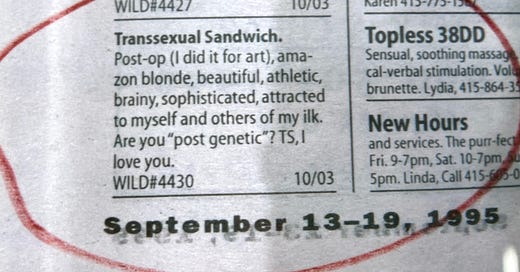This week at Public Seminar, our critics consider artists who challenge—and sometimes explode—the boundaries of identity and belonging. Annell López chats with Rupal Rao about how growing up in an immigrant neighborhood in Newark, New Jersey, influenced her debut short story collection. Abby Merrick explores the automotive interventions and gender hacks of artist Pippa Garner. And Miranda Young reflects on the interplay between loneliness and community in Mitski’s music, while Hannah Burns reviews the musician’s mesmerizing live act.
HE 2 SHE: Artist Pippa Garner Hacks Her Gender
Abby Merrick
Thanks to ambitious recent exhibitions and publications, the puckish spirit that has animated Garner’s work over the course of her career is newly visible to audiences in all its permutations. Her oeuvre is the product of a lifelong, gonzo investigation into questions like: What is a commodity? What is a system? How do commodity units and systems interact? How can the artist intervene? A self-described hacker, she approaches gender and the self as commodities ripe for intervention.
Mitski’s Notes of Yearning
Miranda Young
Growing up mixed race allowed me to take on the view that the self was discontinuous, multiple, liminal. To watch my father and my mother move and comport themselves differently in different spaces—and to learn a different set of norms from one pair of grandparents to the next—gave me a kaleidoscopic approach to love and intimacy. And yet I relate to Mitski’s yearning for something permanent, stable, and eternal. When you are socially scripted as in-between, you still feel a desire to either stay at point A or arrive at point B.
“I was concerned for her knees”
Hannah Burns
In “First Love/Late Spring,” Mitski pretended to teeter on a chair on the edge of the stage, like she was about to jump. There was a second chair flipped over on the floor below her, legs reaching up, like she was about to fall off a rocky ledge. The whole sequence was thrilling, treacherous. To “Heaven,” Mitski used the stage light as a partner, as if dancing with a ghost. She sang a song about eating a whole cake—“I Don’t Like My Mind”—while writhing on the ground. She turned “Happy” into a country two-step, a lonely line dance.
Exploring Immigrant Experiences
Annell López in conversation with Rupal Rao
The American Dream is something that I wanted to illustrate in the stories because it’s the reason why people leave their countries: in the pursuit of a better education, in the pursuit of a life with better means, a life that is easier or more comfortable, or just escaping poverty. Even if you end up not believing in it, it’s the driving factor. It’s a thing that makes you uproot your life and start over.




